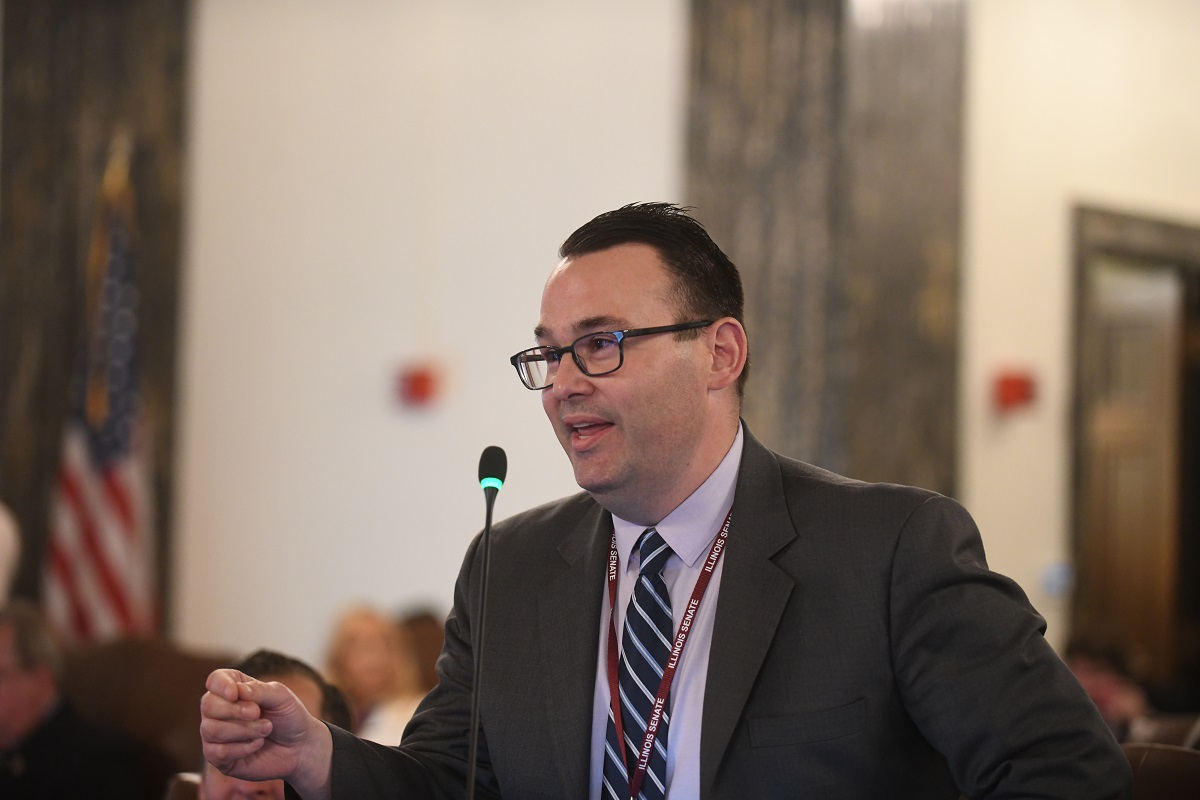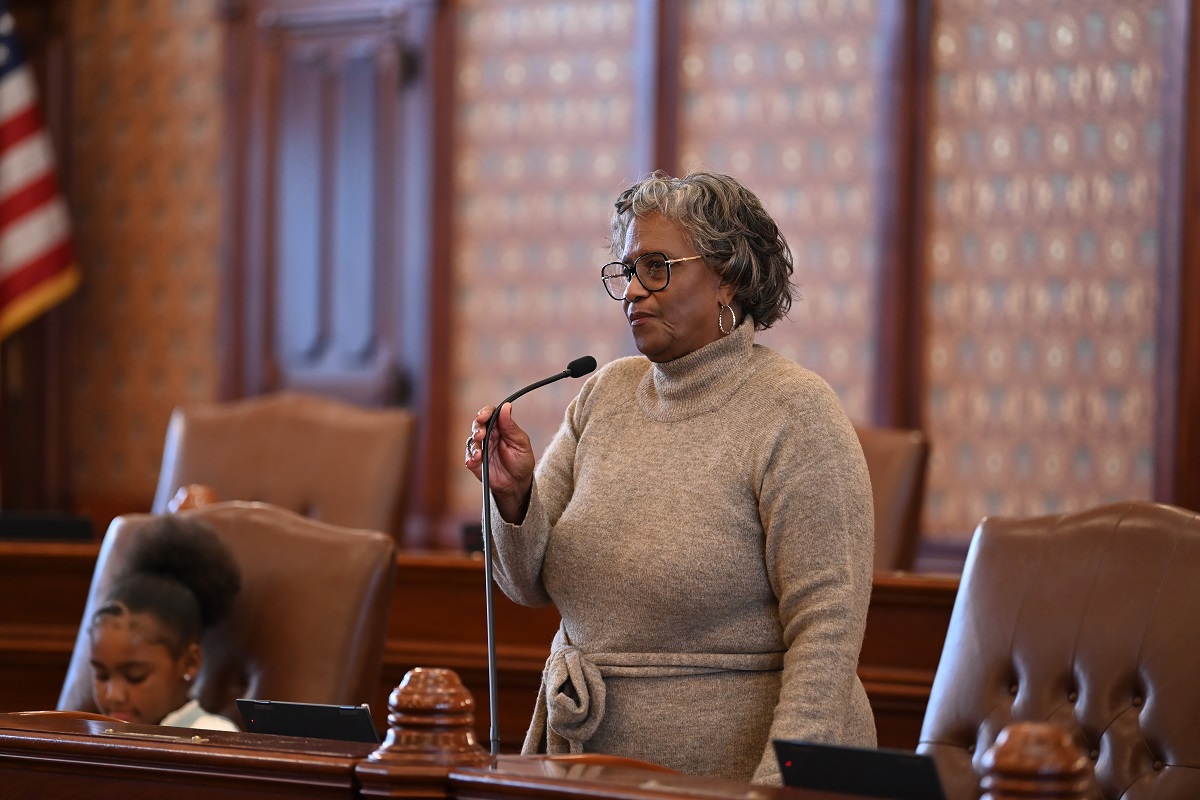- Details
- Category: Member News

SPRINGFIELD – Members of the Illinois Legislative Latino Caucus outlined a number of their investment priorities focused on Latino communities following the governor’s budget address Wednesday.
“We are pleased that the proposal strives to address items of importance to the Latino community, from health care to education,” said Senate Latino Caucus Chair Celina Villanueva (D-Chicago). “Our community is growing and it’s not going anywhere.”
“Our State’s prosperity is intertwined with the success of our Latino community, our state budget must prioritize equitable investment in healthcare, education, and jobs for Latino families,” said House Latino Caucus Chair Dagmara Avelar (D-Bolingbrook). “While we recognize positives in Governor Pritzker’s proposal, we’re committed to further enhancements. We will continue our united mission to serve our communities faithfully.”
- Details
- Category: Senator Mike Porfirio News
 SPRINGFIELD – State Senator Mike Porfirio introduced legislation that would require public colleges and universities to waive transcript evaluation fees for refugees of Iraq and Afghanistan.
SPRINGFIELD – State Senator Mike Porfirio introduced legislation that would require public colleges and universities to waive transcript evaluation fees for refugees of Iraq and Afghanistan.
“In waiving these fees, we can invest in the academic journey of Iraqi and Afghan refugees while helping them,” said Porfirio (D-Lyons Township), who served alongside Iraqi and Afghan translators during Operation Iraqi Freedom and served as a police advisor during the war in Afghanistan. “We have a moral obligation to support those who have served shoulder to shoulder with us.”
Currently, transcript evaluations assess foreign transcripts as part of an admission process for higher education institutions. These evaluations are used to establish a U.S.-equivalent GPA, verify the accreditation of the schools where the applicant obtained or will obtain their degree, and benchmark completed coursework to determine if the applicant has met the prerequisite coursework requirements for their intended program.
Read more: Porfirio legislation breaks higher ed barriers for Iraqi, Afghan refugees
- Details
- Category: Senator Don Harmon News
 SPRINGFIELD – Senate President Don Harmon (D-Oak Park) issued the following statement following Gov. JB Pritzker’s budget proposal for the 2025 fiscal year:
SPRINGFIELD – Senate President Don Harmon (D-Oak Park) issued the following statement following Gov. JB Pritzker’s budget proposal for the 2025 fiscal year:
“The governor’s proposal is a good start.
“Senate Democrats look forward to the discussion of how to balance our serious needs with fiscal realities in the weeks and months ahead.
“My goal is to cross the finish line with a bipartisan, balanced budget that reflects our shared goals of responsibility and security and invests in key priorities for the state of Illinois.”
Read more: Harmon statement on Gov. Pritzker’s budget proposal
- Details
- Category: Member News

SPRINGFIELD – Members of the Illinois Senate Democratic Caucus heard the governor’s state budget proposal Wednesday and will immediately begin bipartisan, bicameral conversations to bring forth a balanced budget that prioritizes Illinoisans in all corners of the state.
“The governor’s proposal is a good start. Senate Democrats look forward to the discussion of how to balance our serious needs with fiscal realities in the weeks and months ahead,” said Senate President Don Harmon (D-Oak Park). “My goal is to cross the finish line with a bipartisan, balanced budget that reflects our shared goals of responsibility and security and invests in key priorities for the State of Illinois.”
The governor’s Fiscal Year 25 budget proposal is built on five years of historic fiscal progress that included balanced budgets, nine credit rating upgrades, eliminating the bill backlog and more. It includes funding for public safety, social services, environmental resources and more.
Prioritizing education – from early childhood to college – is a key highlight of the governor’s proposed budget. It calls for $75 million that would add 3,000 additional slots in preschool deserts and continues the commitment of a $350 million increase toward the evidence based funding model for K-12 education.
Read more: Senate Democrats begin process for fiscally responsible FY 25 budget
- Details
- Category: Senator Patrick Joyce News
 SPRINGFIELD – State Senator Patrick Joyce introduced a measure before the Senate Judiciary Committee Tuesday that would expand the Thorn Creek Woods Nature Preserve in Will County.
SPRINGFIELD – State Senator Patrick Joyce introduced a measure before the Senate Judiciary Committee Tuesday that would expand the Thorn Creek Woods Nature Preserve in Will County.
“The transfer of this portion of land would be a big win for the Thorn Creek Woods Nature Preserve,” said Joyce (D-Essex). “By acquiring more land, there would be an increased opportunity for public uses, allowing residents to further enjoy the natural resources included within.”
Read more: Joyce measure to expand Thorn Creek Woods Nature Preserve passes committee
- Details
- Category: Senator Willie Preston News
 CHICAGO — State Senator Willie Preston advanced new legislation to ban harmful chemicals in candy, soda and other food items sold and produced in Illinois.
CHICAGO — State Senator Willie Preston advanced new legislation to ban harmful chemicals in candy, soda and other food items sold and produced in Illinois.
“People should be able to trust that the food they buy is safe,” said Preston (D-Chicago). “As a father, it really concerns me that some of my family’s favorite food items have harmful chemicals in them.”
Senate Bill 2637 will ban specific, dangerous food additives from being used in the manufacturing, delivering, distributing, holding or selling of food products. These additives include brominated vegetable oil, potassium bromate, propylparaben and red dye no. 3.
- Details
- Category: Majority Report
Turner advances measure to protect consumers
SPRINGFIELD – State Senator Doris Turner advanced a measure that would protect consumers by requiring notice for automatic renewals offered by businesses.
“Some businesses use deceptive tactics with automatic renewals, which can lead to unexpected charges for consumers,” said Turner (D-Springfield). “By providing sufficient notice of renewals, we are ensuring businesses are transparent and not taking advantage of us.”
Stadelman legislation would expand criminal stalking to include electronic tracking
ROCKFORD – State Senator Steve Stadelman advanced legislation through the Senate Judiciary Committee that keeps victims and survivors safe from their abusers by expanding the definition of stalking to include electronic tracking systems.
"As tracking devices become more popular, people are caught using them for the wrong reasons,” said Stadelman (D-Rockford).
Simmons raises awareness among Black communities on Black HIV/AIDS Advocacy Day
SPRINGFIELD – State Senator Mike Simmons stood with the Black Leadership Advocacy Coalition for Healthcare Equity for Black HIV/AIDS Advocacy Day to celebrate the accomplishments in HIV prevention and care and to recognize the work still needed to overcome structural barriers to testing, prevention and treatment in Black communities.
“We have taken steps to reduce the disproportionate impact of HIV and AIDS on Black communities, but disparities continue to exist,” said Simmons (D-Chicago). "It is crucial that we have conversations about HIV/AIDS to increase education, testing, community involvement and treatment among Black communities.”

In case you missed it
MEMBERS IN THE NEWS
Senator Paul Faraci, Champaign: Lawmakers look to give tax credits to employees who have workers that pay student loans | FOX Illinois
Senator Robert Peters, Chicago: IL State Sen. Peters on proposed bill requiring lawyers for kids in police interrogations | WGN Radio
Senator Natalie Toro, Chicago: State Senator advocates for rent control in Illinois for tenant stability | Fox Illinois
Copyright 2024 - Illinois Senate Democratic Caucus - All Rights Reserved
- Details
- Category: Senator Natalie Toro News
 SPRINGFIELD — To assist long-term homeowners from being priced out of their neighborhoods, State Senator Natalie Toro has introduced legislation that would expand eligibility for the long-time occupant homestead exemption.
SPRINGFIELD — To assist long-term homeowners from being priced out of their neighborhoods, State Senator Natalie Toro has introduced legislation that would expand eligibility for the long-time occupant homestead exemption.
“Historic communities should not be disrupted because of greed,” said Toro (D-Chicago). “This measure will give established homeowners more opportunity to keep their homes, preserving communities that have been cornerstones for generations.”
Under Toro’s measure, the threshold for qualifying for the long-time occupant exemption would be lowered, allowing more homeowners to benefit. Currently, homeowners must experience a property assessment increase exceeding certain percentages to be eligible for the exemption. Senate Bill 2845 would lower these percentages from 10% to 5% for households earning between $75,000 and $100,000, and from 7% to 3% for households earning $75,000 or less. The property must also be occupied for 10 continuous years or 5 continuous years if the person receives assistance to acquire the property as part of a government or nonprofit housing program.
Read more: Toro to mitigate gentrification in 20th District with tax relief legislation
More Articles …
- Ventura introduces bill to legalize Psilocybin in Illinois under limited use to treat mental health conditions
- Toro pushes for rent control to combat rising housing crisis
- The Majority Report 02/12/24 - Expanding fertility coverage, holding funeral homes accountable and more
- Ventura introduces measure to tackle hospital staffing issues
Page 147 of 768


